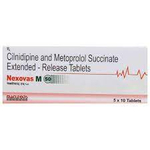Metolet CL 10mg/50mg Tablet

Metolet CL 10mg/50mg Tablet
Metolet CL 10mg/50mg Tablet contains Cilnidipine and Metoprolol Succinate, a potent duo for managing high blood pressure. Cilnidipine relaxes blood vessels, while Metoprolol reduces the heart's workload, effectively lowering blood pressure.
Cilnidipine eases blood flow by relaxing blood vessels. Metoprolol, a beta-blocker, slows down the heart rate and reduces its force together, they address high blood pressure from multiple angles for better control.
This medication can be taken with or without food. For consistent results, take it at the same time each day. Swallow the tablet whole without chewing, crushing, or breaking it.
Be cautious of a potential decrease in blood pressure. Move slowly when standing up from sitting or lying positions to avoid dizziness or fainting. Monitor blood sugar levels if you have diabetes, as both medications can affect glucose control.
Possible side effects include headache, nausea, dizziness, palpitations, edema (swelling), abdominal pain, rash, muscle pain, eye pain, tremors, and decreased blood pressure. Contact your healthcare provider if these symptoms persist or worsen.
If you miss a dose, take it as soon as you remember. However, if it's nearly time for your next dose, skip the missed one and continue with your regular schedule.
Similar Medicines
Related Faqs

Is Cilacar safe for kidney patients?
The findings of this research highlight the safety and efficacy of cilnidipine in the reduction of lowgrade albuminuria in hypertensive patients with chronic kidney disease CKD This implies that by initiating early treatment with cilnidipine individuals with hypertensive CKD and lowgrade albuminuria can potentially prevent cardiovascular disease Notably cilnidipine demonstrates its ability to effectively mitigate albuminuria without compromising patient safety The study provides valuable insights into the potential benefits of cilnidipine as a therapeutic option for managing hypertensionrelated CKD Specifically lowgrade albuminuria which is a common marker of kidney damage in patients with hypertension was significantly reduced with the administration of cilnidipine This suggests that cilnidipine can effectively address the pathophysiological mechanisms underlying albuminuria in this population Early intervention is crucial in the management of CKD particularly in individuals with hypertension By initiating treatment with cilnidipine in hypertensive CKD patients exhibiting lowgrade albuminuria healthcare professionals can potentially mitigate the risk of cardiovascular diseases which are commonly associated with CKD This research further strengthens the growing body of evidence supporting the use of cilnidipine as a safe and effective treatment option for hypertensive patients with CKD In conclusion this study underscores the positive impact of cilnidipine in reducing lowgrade albuminuria in hypertensive individuals with CKD By implementing early treatment strategies involving cilnidipine clinicians can potentially prevent the progression of kidney damage and minimize the risk of cardiovascular disease thus improving patient outcomes and overall quality of life

Is Amlodip a beta-blocker?
Amlodip is not classified as a betablocker rather it falls into a category of medications called calcium channel blockers The primary mechanism of Amlodip is to alleviate high blood pressure by inducing relaxation in the blood vessels thereby facilitating smooth blood flow through them By targeting calcium channels Amlodip prevents excessive calcium influx into the cells of arterial walls resulting in vasodilation and a decrease in blood pressure This unique mode of action distinguishes Amlodip from betablockers which operate by blocking beta receptors leading to a reduction in heart rate and cardiac output By contrast Amlodips selective targeting of calcium channels makes it a potent medication for managing hypertension while avoiding certain side effects associated with betablockers such as bradycardia or a decrease in heart rate Consequently Amlodip is widely prescribed to patients with high blood pressure or angina as it can effectively relax blood vessels reducing the workload on the heart and improving overall cardiovascular health

Is Amlowalk a beta-blocker?
No Amlowalk does not fall under the category of betablockers Rather it is classified as a calcium channel blocker within the realm of pharmaceuticals Its primary function is to effectively reduce blood pressure by inducing a relaxation response in the blood vessels facilitating smoother blood flow throughout the bodys circulatory system This relaxation effect allows for improved circulation as it eases the passage of blood through the network of blood vessels By inhibiting the influx of calcium into the muscles lining the blood vessels Amlowalk assists in preventing the constriction of these vessels subsequently promoting lower blood pressure levels This mechanism of action sets it apart from betablockers which function by reducing the effects of certain stress hormones on the heart and blood vessels Therefore when considering Amlowalk it should be noted that its distinct pharmacological classification and mechanism of action make it an effective medication for managing hypertension and related conditions
Related Posts

1:15
What Are the Best Foods to Keep Your Kid’s Brain Healthy?

1:15
How Does Vitamin D3 Deficiency Affect Your Body? Shocking Symptoms Revealed!

1:15
Why Is Calcium Important for Kids? Common Deficiency Symptoms You Shouldn’t Ignore!

1:15
How to Increase Your Child’s Weight Naturally? Healthy Diet Tips for Parents!

1:15
Are Your Hormones Out Of Balance? Signs & Symptoms!
Disclaimer : This information is not a substitute for medical advice. Consult your healthcare provider before making any changes to your treatment . Do not ignore or delay professional medical advice based on anything you have seen or read on Medwiki.
Metolet CL 10mg/50mg Tablet
Prescription Required
Packaging :
strip of 10 tablets
Manufacturer :
Ikon Remedies Pvt LtdComposition :

















.svg)
